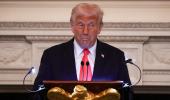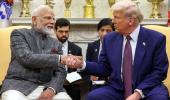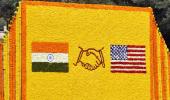'I certainly hope the two can avoid a trade war and believe they will.'

Mark Linscott, former assistant United States Trade Representative (USTR) for South and Central Asia, led negotiations for the unsuccessful mini-trade deal with India during Donald Trump's first term.
Now a senior advisor with the US India Strategic Partnership Forum (USISPF), Linscott, in an e-mail interview with Asit Ranjan Mishra/Business Standard, discusses the potential impact of Trump's reciprocal tariff on India and feasibility of the proposed bilateral trade agreement (BTA).
How do you think the reciprocal tariffs that are set to kick in from April 2 could be structured, especially for India?
Frankly, it's hard to say. I sense some in the Trump administration don't want to over-complicate an already complicated scenario.
My bet is that reciprocal tariffs applied to any trading partner in April will use a simple average tariff rather than a trade-weighted one.
The tariff applied will likely be set at a level to provide for equivalence with India's simple average applied tariff.
How seriously reciprocal tariffs could hurt India and which sectors could be worst hit?
No country's exporters favour new tariffs and there can be real impacts, especially for price-sensitive sectors that face plenty of competition in global markets.
If a reciprocal tariff in the range of 10 to 15 per cent across-the-board was applied to India or any target country, the impacts will be significant for most exports.
Above that level could even shut down exports of some products, all depending on whether many countries are hit simultaneously.
Since India has agreed to negotiate a bilateral trade agreement (BTA) with the US, do you think the Trump administration will spare New Delhi from reciprocal tariffs or use it as a bargaining tool?
First, I'm very pleased that the US and India have started negotiating a big agreement. It's high time and I think both sides are motivated.
But I will be surprised if a deal on tariffs can be done in a matter of a week or two that avoids reciprocal tariffs altogether.
Trump's expectations that India will reduce its tariffs to US levels are very ambitious.
If Trump imposes reciprocal tariffs on India, do you think it may lead to a trade war like situation and New Delhi may retaliate?
I certainly hope the two can avoid a trade war and believe they will. I expect some in India will push for retaliatory tariffs if the Trump administration applies significant reciprocal tariffs.
However, I don't think that will advance interests in serious negotiations to seek a broad and deep BTA.
In fact, it could backfire, with Trump responding with additional tariff increases and negotiations on a BTA getting set back.
You were part of the mini-trade deal negotiations between both sides.
What led to the breakdown of the talks? What was agreed upon and what couldn't be resolved?
I was the first lead US negotiator to do a mini-trade deal during the first Trump administration and before that I negotiated with India in the WTO over many US administrations, Republican and Democrat.
I think that the mini-trade deal was a tremendous effort by both sides, and we learned a lot about how to formulate a negotiating agenda and think creatively in solving problems.
In the end, I'm not sure that President Trump thought it was large enough to eliminate most trade barriers between the two countries and make any substantial dent in the US trade deficit with India.
Since President Trump has undermined the USMCA (United States-Mexico-Canada Agreement) -- a deal he himself renegotiated during his first term -- through his tariff actions against Canada and Mexico, how can other countries, including India, trust him to negotiate bilateral trade deals?
It is a fair question. I lean towards believing that the Trump administration will be faithful to its word in future trade agreements because its leverage will be diminished if it starts to upend them.
Leverage is a precious commodity in trade negotiations, and care should be taken to preserve leverage where it exists.
In which sectors do you think the US would push India to bring down tariffs under the BTA? From India's side, what do you think will be the key demands?
On priority US sectors, let's start with agriculture. That may be the hardest and the most sensitive sector, but it is central to success in the negotiations.
There are even areas, such as US feed grain exports, where there could be mutual benefits, given that Indian livestock producers, particularly poultry farmers, need new sources for feed.
Another key sector is the digital realm, which is actually cross-sectoral.
I expect US negotiators to push for a digital chapter in the BTA.
I also think that the health sector could offer benefits on both sides, especially in pharmaceutical and medical device markets.
India also has interests in all of these sectors -- agriculture, digital, and health.
Beyond these areas, I think it's likely that India will push for more predictability in visas for high-tech professionals.
Do you think both sides can realistically conclude a trade deal by the fall of 2025 as they have publicly committed to?
In fact, the two sides have committed to conclude the first tranche of a BTA by the fall of this year.
I fully expect that negotiations to conclude a BTA will extend into 2026 and maybe even 2027.
Trade negotiations are never easy, but I think a first tranche is doable.
The most immediate question is whether they can do a tariff deal even sooner before Trump's reciprocal tariffs are applied.
What do you have to say about the impression among developing countries that after immensely benefiting from globalisation, now developed countries are turning their back on it as they are losing their competitive advantage?
Certainly, the US has a much different perspective, which is at the root of some of the grievances that President Trump feels about unfair foreign tariffs and non-tariff barriers.
While India and several other major developing countries may be within their WTO commitments with their current tariff schedules, they did not seriously try to negotiate market access in the Doha Round of negotiations.
That has left huge tariff disparities, which is the case between India and the US.
The US simple average of 'bound' WTO tariffs is 3.4 per cent, while the Indian 'bound' rate is around 50 per cent, and the applied rate at 17 per cent.
This situation was never very sustainable and is one of the reasons the WTO has lost relevancy over the last two decades.
Do you think WTO will formally cease to exist as an institution with the US imposing reciprocal tariffs on countries, ignoring the multilateral obligations of each member country?
The WTO has been on decline for many years before the first Trump administration.
Its failure in the Doha Round to continue the progressive liberalisation of global trade, and, in particular, tariffs, led to the collapse of negotiations.
In its wake, populist forces on trade have unfortunately taken root.
We may be entering a bit of a Wild West scenario with tariffs, perhaps similar to that which existed between the two world wars in the 1930s, and I expect global trade and the global economy could suffer the consequences.
Feature Presentation: Aslam Hunani/Rediff.com












 © 2025
© 2025